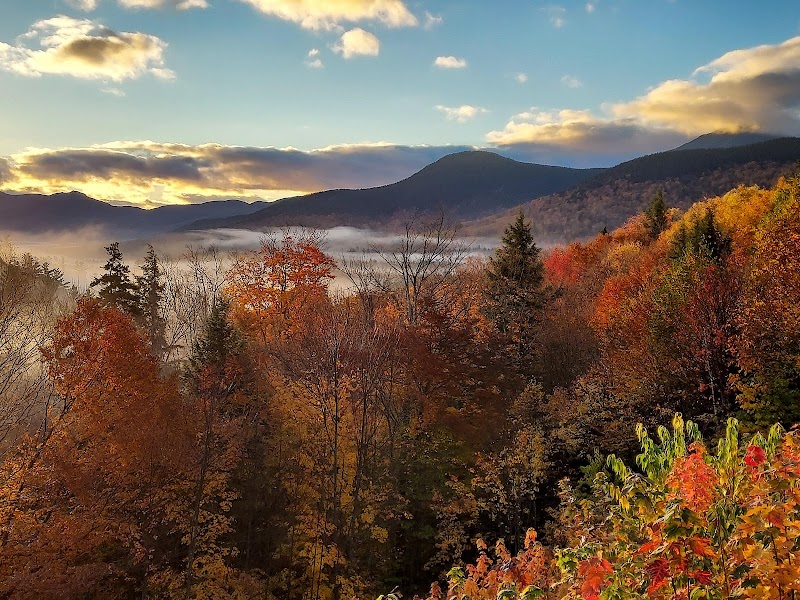
Conquer the Trails: Lakes Region Mountain Bike Festival in Ashland, New Hampshire
The Lakes Region Mountain Bike Festival in Ashland, New Hampshire, offers both challenging terrain and a vibrant community for riders of all levels. Experience rugged forest paths, technical climbs, and sweeping descents while gaining practical insight into trail riding in the heart of New England.
Hydrate Generously
Carry at least two liters of water, as the mix of elevation gain and technical riding demands constant hydration.
Wear Appropriate Footwear
Choose mountain biking shoes with solid grip to handle rocky and root-laden trails without slipping.
Take Advantage of Clinics
Attend beginner and intermediate trail clinics offered during the festival to improve technical skills and trail safety knowledge.
Start Early
Arrive at the trailhead before 8 a.m. to enjoy cooler temperatures and quieter trails, plus the chance to spot local wildlife.
Conquer the Trails: Lakes Region Mountain Bike Festival in Ashland, New Hampshire
Ashland, New Hampshire, stretches out as a proving ground for riders at the Lakes Region Mountain Bike Festival, a weekend where rugged trails and community spirit collide. Set against the backdrop of the White Mountains' lesser elevations, this festival challenges riders of every stripe to engage with terrain that refuses to be tamed but invites respect. From tight singletrack threading through pine and hardwood forests to rocky climbs that demand both grit and finesse, the festival routes range from adrenaline-fueled descents to steady climbs, generally spanning 10 to 20 miles with elevation gains in the range of 1,000 to 2,500 feet depending on the chosen trail.
The trails below the peaks run with personality—roots gripping the soil, stones daring a steady line, and winds whispering through leaves that bristle with summer energy or crackle with autumn’s chill. For those new to mountain biking, the festival offers clinics and guided rides focused on technique and trail etiquette, making it inclusive without compromising the raw adventure. For seasoned riders, timed races and technical challenges test balance, endurance, and focus.
Practical considerations frame every pedal stroke at this festival. Sturdy shoes with good grip are non-negotiable; the terrain wears down tires and riders alike. Carry at least two liters of water—sweat doesn’t ask for permission—and bring layers to adapt to sudden shifts in New England weather. Early starts pay off: the morning air is crisp, trails are less crowded, and wildlife holds tight to the edges of the woods, waiting. The festival venue in Ashland is easily accessible, with parking and bike repair stations, so logistical challenges won’t slow your momentum.
Beyond the thrill of the ride, the festival fosters community in lively vendor zones and evening socials, where tired muscles meet fresh stories. Local eateries offer hearty fare, a practical counterpoint to the day’s exertion. More than a race or ride event, the festival is a reminder that nature is fiercely itself—unforgiving at times, demanding respect, yet always rewarding those who accept its challenge with preparation and passion.
Whether you aim for the competitive circuits or the more leisurely tours, the Lakes Region Mountain Bike Festival delivers a balanced experience. It invites you to engage directly with terrain that moves beneath you, listen to the forest’s rhythm, and push yourself through moments of both strain and exhilaration. The trails wait—not just to be ridden, but to be understood.
Nearby Trips
All Adventures
Boat Charters
Water Activities
Adventures near Ashland, New Hampshire
Discover the unique and memorable adventures that make Ashland, New Hampshire special.
Frequently Asked Questions
What types of trails are available during the festival?
Trails vary from beginner-friendly singletrack loops to highly technical sections featuring rocky ascents and fast descents. Routes are clearly marked, and festival guides can help you choose based on skill level.
Are rentals and repairs available on site?
Yes, the festival provides bike rental options and mobile repair stations staffed by local mechanics, ensuring riders can get back on the trail without hassle.
Is the festival family-friendly?
Absolutely. There are designated beginner trails and family activities alongside competitive events, welcoming riders of all ages and experiences.
What wildlife might I encounter on the trails?
Expect to see white-tailed deer, red squirrels, and a variety of bird species like woodpeckers and warblers. Early mornings offer the best chances to spot more elusive animals.
How physically demanding are the trails?
While some routes are moderate and suitable for most riders, many involve sustained elevation gain and technical terrain, so a good fitness level and confidence on a bike are advised.
Can I participate if I’m new to mountain biking?
Yes. The festival includes skill-building workshops and guided rides designed to introduce newcomers to safe riding techniques and trail navigation.
Recommended Gear
Helmet
Protect your head with a properly fitted mountain bike helmet to reduce risk during technical sections and rough terrain.
Hydration Pack
A hydration pack allows hands-free access to water, critical during longer rides and warmer weather.
Multi-tool Kit
Carry a compact multi-tool kit for quick adjustments or repairs on the trail to avoid ride-ending mechanical failures.
Layered Clothing
Dress in layers that wick moisture and provide insulation, allowing quick adaptation to fluctuating New England temperatures.
Local Insights
Hidden Gems
- "The Quiet Hollow overlook for panoramic views with fewer crowds"
- "A small waterfall just off the Lakes Region trails, perfect for a mid-ride break"
Wildlife
- "Eastern chipmunks dart among underbrush"
- "Occasional sightings of barred owls in late evening"
History
"Ashland’s trails weave through lands once traversed by Native Abenaki peoples and later by logging communities in the 19th century, adding layers of cultural significance beneath every pedal stroke."
